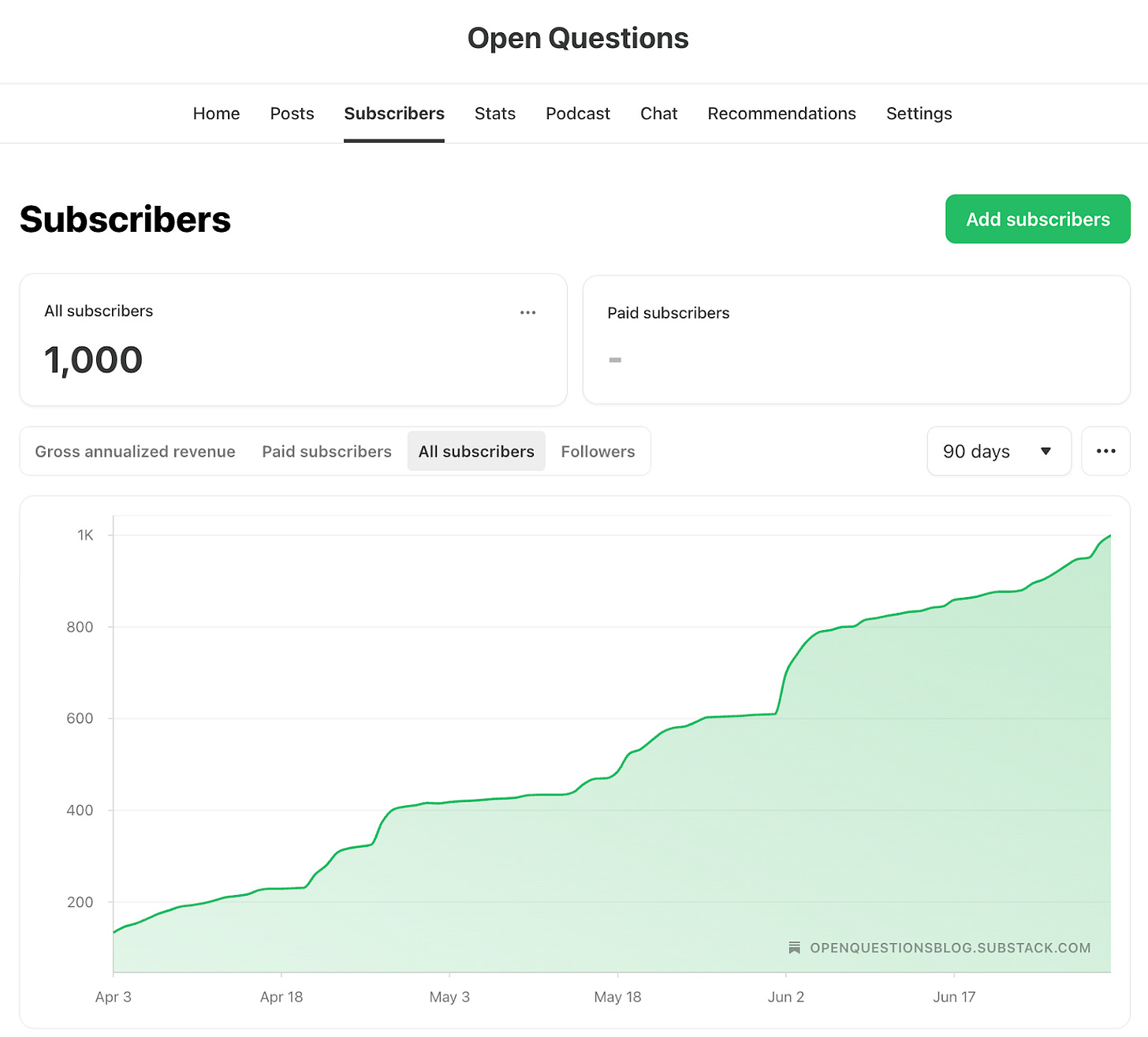Thanks for reading Open Questions. Exactly three months after my first post, I hit 1000 subscribers.
My original goal was to publish roughly once a week—I wrote 11 essays in 13 weeks.
My most popular essay was my very first one—a manifesto about intellectual tribalism on the left. It has logged 20,000 views and 470 likes. I workshopped a draft with my fellow faculty fellows at the Edmond & Lily Safra Center for Ethics at Harvard. Any remaining errors are theirs.
My personal favorite essay explored the limits of standpoint theory. I got to flesh out some ideas that had been gnawing at me for a while, inspired by a conversation over drinks with two good friends.
I also celebrated ChatGPT, defended youth medical transitions while critiquing American clinical policy, and turned an obscure metaphysical question into an accessible psychological one.
I’m grateful to readers for sparing a few minutes for my ideas. Next time you enjoy an essay, please like or comment in order to resuscitate my plummeting self-worth—and also juice the Substack algorithm, putting the essay in front of more eyeballs.
Over the past two years, I’ve read approximately one (1) shit-ton of Substack posts. There are so many interesting writers on this platform. I never skip
, , , , or .I’ve also been enjoying
, , , , , , , , , , , , , , , , , , , , , , , , , , , , , , , , , , and my long-suffering wife .If you have a Substack and I failed to mention you, either I forgot or you refused to call on me in a Q&A session in 2012.
If you don’t have a Substack, you’re now in the minority. Should you start one?
If you’re a philosopher, no. It would distract from more important activities, like identifying errors in someone’s response to an objection to the manipulation argument against free will.
Otherwise, yes. Writing regularly is excellent motivation to think through ideas and develop a voice. You never understand an idea as well as when you have to convey it to smart people (like you, dear reader).
Academics are trained to write so precisely that our meaning is unmistakable to the twelve other people in our sub-sub-field—and of interest only to them. If you want to reach people, dare to be misunderstood.
Fortunately, public writing is very much a learnable skill. Beyond reading it incessantly for a decade, I benefited a lot from a Marc Sanders Foundation workshop run by the tireless Barry Lam. (How many books/podcasts/essays are you working on now, Barry?) I also learned from James Ryerson and Joseph Fridman. (Academics, apply to the next Beyond the Ivory Tower workshop!)
No one taught me more than my wife Meghan, an extraordinary writer who has written hundreds of brilliant pieces of journalism and personal essays. Her debut novel A World Apart is dropping in 2026. When I initially turned to public writing a few years ago, Meghan edited my drafts so thoroughly she was essentially an uncredited co-author. Nowadays, she still offers feedback on most things I write but has a lighter touch. [Ed. note: Suspiciously fawning. Did you forget to start the dishwasher again?]
Meghan has given me a lot, so I try to give back.
Looking ahead, my goal is to become a staff writer at The New Yorker and The New York Times. On the off chance that doesn’t pan out, my backup goal is to post on Substack roughly once a week.
How do I post regularly? I stockpile approximately one (1) shit-ton of notes on various topics, update them obsessively, and then, each week, pick the ripest. I’m consistently surprised how after a few hours of research I go from “hmm but do I really have anything to say?” to “there are at least 12 things I want to say.”
Coming soon:
Wokescolds on social media
How academics should approach LLMs
Gender identity as socially learned
Affirmative action in academic hiring
Ancient DNA and human sociality
My first four months on Substack
What else should I write about? Other advice? C’mon, juice that algorithm.







With the “vibe shift” etc the time is ripe for the first “actually the woke were right about everything” contrarian poece.
You should write about shrimp!